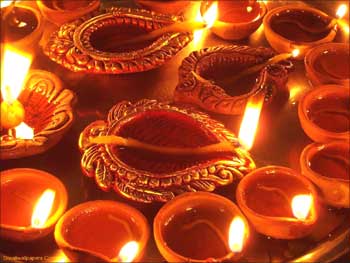
Those who plan to celebrate this Diwali in a grand way have an option to go for designer diyas or eco-friendly ones.
The diyas or earthen lamps, a must in Diwali festivities, can be bought for as low as a few rupees to as high as nearly Rs 10,000 a piece. Besides various high-street markets in the city, a number of online shopping websites, including eBay and Amazon, have stacked up Diwali diyas for sale.
A set of brass sculpture Ganesh Laxmi Saraswati bell diya is currently on sale at eBay, the world's leading online market, for Rs 9,550, while it has many other diyas on offer for a few thousands of rupees.

Amazon, another major player in online shopping, is offering a set of terracotta diyas, along with a Ganesha statue, for $34 (about Rs 1,600), while another shopping site -- Indian Gifts Portal -- has a wide range of diyas, priced from a few hundreds to thousands of rupees.
The green concept also seems to have caught up with those involved in the diya business. There are many varieties being sold with the names like 'green diya' -- the eco-friendly angle is their green colour and the earthen make.
With an apparent target at NRIs, online shopping website 99 Unlimited is selling 'earthen green diyas' for $2 (about Rs 100), while offering a discount to the 'original price' of $3.
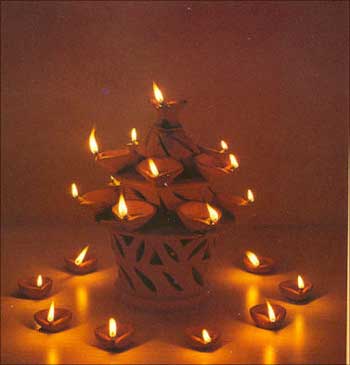
On the other hand, vendors in almost all neighbourhood make-shift stalls are selling earthen diyas for prices as low as a dozen for Rs 2.
Surprisingly, those selling the modest earthen diyas are also counting the rich people among their major customers as the 'modesty' attached with the use of such lamps is being seen as a fashion statement in the name of austerity.
With the middle class shifting its loyalties to durable and reusable plastic lamps and candles for lighting up their houses during Diwali, the upper class has come up as their saviour, the potters believe.
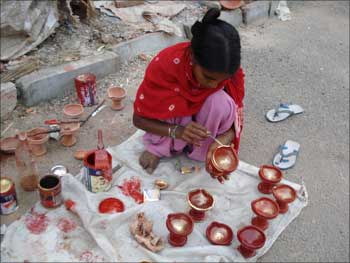
Clay-made diyas, idols and other decorative items have found new admirers in the upper class.
The rich find these earthen diyas and decorative items more attractive and ethnic that make their homes more beautiful during the time of celebration, said city potters.
"Not all, but rich people buy our products," said Hoori Lal, a potter who operates from his shop-cum-house near Apollo Hospital along Mathura Road in Delhi.
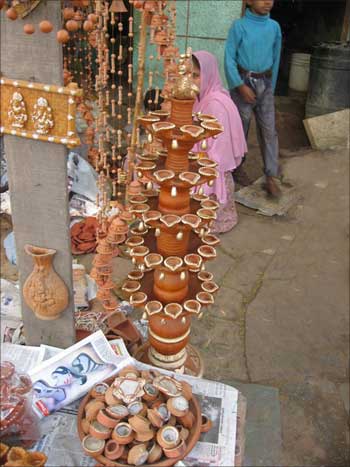
"They buy every thing from lamps to idols to decorative items, but only if they have a different look," Hoori said.
"They buy only those items which are artistically designed, colourful and decorated. The most important thing is that they (the rich) don't even go for bargaining," he said.
Neeraj, another potter who has his outlet along Mathura Road, expressed similar views. "It's beneficial to deal with the rich as they generally buy expensive items without much bargain," he said.
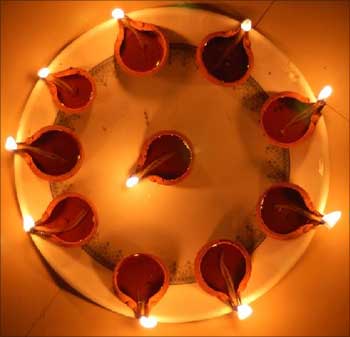
About 200 varieties of designer earthen lamps -- in the shape of gods and goddesses, betel leaves and colourful birds and animals -- are available in Mathura Road.
For the people, it is not the price but the design that attract them to the potters every Diwali.
"Price is never an issue, it is the artistry involved in these items which make them priceless," said Meha, a finance executive at an MNC shopping for earthen showpieces.
"I like these items as they are colourful and artistic. They give the interior a refreshing look also. Eco- friendliness is another factor," she said.
The potters, however, expressed their concern for many customers moving away from earthen items for other products.
"On an average we are getting Rs 2,000-2,500 daily this year, down from over Rs 3,000 we used to get earlier," said Hoori.